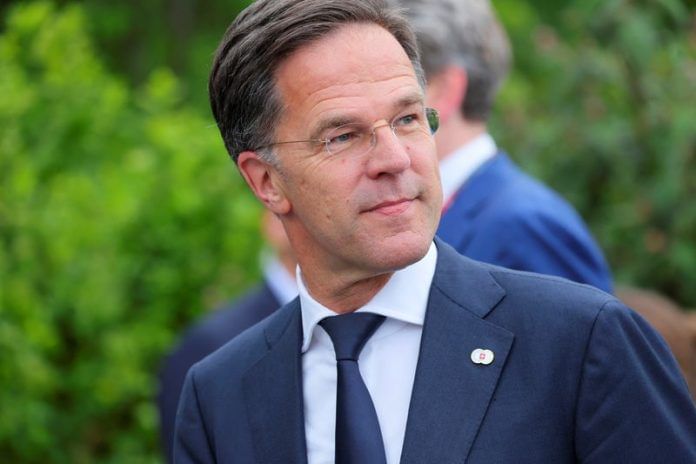By Andrew Gray and Anthony Deutsch
BRUSSELS/AMSTERDAM (Reuters) – – NATO’s next boss, Mark Rutte, will need all the coalition-building skills he honed as Dutch prime minister to hold the Western alliance together amid war in Ukraine, fears over Moscow’s next move and political uncertainty in Washington.
Rutte takes over on Tuesday as secretary-general of the North Atlantic Treaty Organization from Norway’s Jens Stoltenberg – the first time in a decade that NATO’s top job will change hands.
Much now rests on Rutte being able to forge consensus within the 32-member alliance. Its ability to safeguard the nearly 1 billion people under its protection depends not only on military might but also on political unity.
Challenges abound for Rutte: a possible return of NATO-sceptic Donald Trump as president of the United States – the alliance’s predominant power – as well as calls from eastern European allies for more reinforcements to protect against Russia, and pleas from non-member Ukraine for more military aid.
NATO officials and diplomats expect Rutte to maintain Stoltenberg’s priorities – rallying support for Kyiv, pushing NATO countries to spend more on defence, and keeping the U.S. engaged in European security.
Having governed for 14 years to become the Netherlands’ longest-serving prime minister, Rutte, 57, is an experienced hand on the world stage.
But – while personally affable – he has sometimes been a blunt critic of other governments, telling Hungary to respect LGBTQ rights or leave the European Union and questioning the rule of law in Romania and Bulgaria.
In his new job, Rutte will need the skills he developed as a coalition-forger and manager who led four Dutch governments.
“The fact that he is so experienced in finding ways to go forward, compromises, persuading people, convincing people, connecting to people – I think that will come in very, very useful,” said Kajsa Ollongren, a former Dutch defence minister who served under Rutte.
Ollongren and others describe Rutte’s leadership style as extremely driven and hands-on, which may come as something as a shock to a hierarchical organisation like NATO.
“He will never think: Oh, well, I can leave this until tomorrow,” Ollongren told Reuters.
Ollongren said Rutte could combine courtesy with firm messages, such as when he contradicted Trump during a live press conference or when he shook Russian President Vladimir Putin’s hand for so long during a visit to Amsterdam that Putin was forced to see protesters with rainbow flags.
EASTERN APPROACH
Rutte’s coming of age as an international politician came in 2014 after Malaysian Airlines flight MH17 was shot down by a Russian missile system over eastern Ukraine, killing all 298 passengers and crew, including 196 Dutch citizens. He promised to hold accountable those responsible.
In his new job, Rutte will be under pressure from NATO members in eastern Europe to prove he understands their desire for more protection from Russia and can deliver for them.
“One test for him will be: What is NATO’s ambition vis-a-vis the eastern flank and especially the strengthening of the eastern flank?” said Peter Bator, who served as Slovakia’s ambassador to NATO until earlier this year.
Since Russia’s full-scale invasion of Ukraine, NATO has doubled to around 10,000 the troops deployed to its eastern members, on top of those countries’ national forces. It also says hundreds of thousands more could be deployed quickly.
But eastern countries want more troops and weapons – especially air defence systems, which means persuading western members to move more of their own assets east.
As NATO makes decisions by consensus, the power of a secretary-general depends on coming up with policy ideas and persuading national leaders to support them.
The job, said Oana Lungescu, a former NATO spokesperson, is about “not just reaching the lowest common denominator but also moving the alliance forward”.
“That’s where the magic comes in between being the secretary and being the general,” said Lungescu, now at defence think-tank RUSI.
MORE DEFENCE SPENDING
NATO officials and diplomats say Rutte may have to temper his characteristically Dutch fixation on fiscal frugality.
At an EU summit in June, Rutte clashed with other leaders when he and German Chancellor Olaf Scholz strongly opposed joint borrowing to fund defence spending.
Polish Prime Minister Donald Tusk said other leaders “loudly reminded” Rutte that he would soon be NATO boss and should do everything to make sure governments did not skimp on defence.
NATO estimates 23 of its 32 members will meet its goal of spending 2% of GDP on defence this year – with the Netherlands only now reaching a target that was set a decade ago.
Many NATO officials argue spending will need to increase further – perhaps to 2.5% of GDP or more – for extra troops and arms to fulfil a massive revamp of the alliance’s defence plans.
“This is a challenge for him – to persuade the member states to invest more in their own defences and much faster, to procure capabilities that go far beyond the existing ones,” said Bator.
(Additional reporting by Anthony Deutsch in Amsterdam; Editing by Gareth Jones)
Disclaimer: This report is auto generated from the Reuters news service. ThePrint holds no responsibilty for its content.




